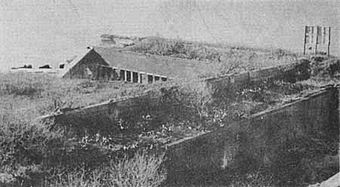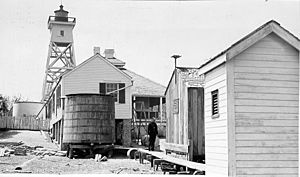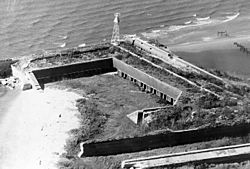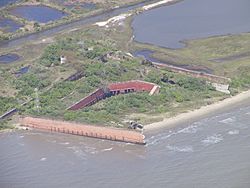Fort Livingston, Louisiana facts for kids
Quick facts for kids |
|
|
Fort Livingston
|
|

Fort Livingston's remaining walls
|
|
| Location | Western end of Grand Terre Island, Jefferson Parish, Louisiana, USA |
|---|---|
| Nearest city | Grand Isle, Louisiana |
| Area | 5 acres (2.0 ha) |
| Built | 1841 |
| Architect | Lieut. H. G. Wright; Col. Joseph Gilbert Totten |
| NRHP reference No. | 74000925 |
| Added to NRHP | August 30, 1974 |
Fort Livingston is a historic fort built in the 1800s. It is located on Grand Terre Island in Jefferson Parish, Louisiana. The fort was named after Edward Livingston. He was an important person who served as Mayor of New York City and a U.S. Senator for Louisiana. He also worked for President Andrew Jackson as the U.S. Secretary of State.
Fort Livingston was added to the National Register of Historic Places on August 30, 1974. The first plans for the fort were made by Lieutenant H. G. Wright. His plans showed a strong, four-sided fort. It was designed to be surrounded by a water-filled ditch and extra defenses on the land side. The fort's walls were made from cemented shells, covered with bricks, and decorated with granite.
This fort is one of the biggest coastal forts in Louisiana. It is also the only fort in the state located right on the Gulf of Mexico. Fort Livingston is a great example of American coastal forts from the early 1800s. Today, it stands mostly in ruins.
Contents
History of Fort Livingston
In the early 1800s, Grand Terre Island was home to pirates. These pirates were led by Captain Jean Lafitte. The U.S. government made the pirates leave the island in 1814. This was so they could build a fort to protect the coast.
Why the Fort Was Built
The fort was also planned to control the entrance to Barataria Pass. This would help guard New Orleans from attacks by ships coming from the south. The U.S. government bought the land for the fort from Etienne De Gruy.
Building the Fort
Construction started in 1834 but stopped for a while. It began again in 1840, and the fort itself started being built in 1841. Major P.G.T. Beauregard helped lead this work. A lighthouse was added near the fort in 1856.
Building the fort stopped when the American Civil War began. It was never fully finished.
Fort Livingston During the Civil War
During the Civil War, soldiers from the Confederate side briefly took over the fort. However, Fort Livingston never saw any actual fighting. The Confederates used it to protect ships called "blockade runners." These ships secretly brought supplies into and out of Barataria Pass on their way to New Orleans.
General Lovell was in charge of the Confederate soldiers at Fort Livingston. There were about 300 men in four companies. The fort had 15 guns, including large cannons. After New Orleans was captured by Union forces, the Confederate soldiers left the fort.
After the War and Abandonment
After the Civil War, only one soldier, called an Ordnance Sergeant, lived at the fort starting in 1866. A big hurricane in 1872 destroyed most of the fort. After this, it was left empty for good. Most of the fort's guns were taken away in 1889. The last Ordnance Sergeant removed all the remaining ammunition on February 16, 1889.
An interesting fact is that a shrimp cannery opened next to the fort in 1867. This was where the first shrimp were canned! In 1923, the U.S. government gave control of the fort and the island to the State of Louisiana.
Fort Livingston Today
In 1955, Grand Terre Island became a special area for wildlife and fishing. Later, in 1979, the Louisiana state government created the Fort Livingston State Commemorative Area.
Visiting the Ruins
The remains of the fort are a bit of a tourist attraction. However, you can only reach it by boat. The U.S. Coast Guard watches over the area closely. The fort is located directly across Barataria Bay from the Coast Guard Station on Grand Isle, Louisiana.
Grand Terre Island used to have a marine laboratory for the Louisiana Department of Wildlife and Fisheries. But it was destroyed by Hurricane Gustav in 2008.
Protecting the Fort
The fort itself is part of a project to protect the coast from waves. The Louisiana Department of Natural Resources is working on this. They built a rock wall to help save the Gulf shoreline of West Grand Terre Island and protect Fort Livingston. Strong tropical storms in 2002 caused the island to wear away much faster. This made it necessary to build a protective barrier.
 | Stephanie Wilson |
 | Charles Bolden |
 | Ronald McNair |
 | Frederick D. Gregory |






